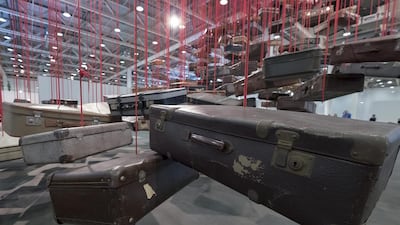AFP
Hundreds of suitcases hang eerily from the ceiling, old publications depict colonial scenes of dark “savages” committing horrific acts of violence, and an anti-protestor gun blasts into life ... with rounds of birdsong.
A common theme – of angst at a world in political turmoil, beset by a migration crisis and dread of terrorism – unites many of the works at this year’s Art Basel, the world’s biggest contemporary art fair.
“As anyone knows who reads the papers, these are very dynamic times,” said Art Basel director Marc Spiegler ahead of the three-day show’s public opening on Thursday, June 16.
“We have major political elections coming up, we have major referenda coming up, we have mass migration in Europe, we have economic uncertainties,” he said, pointing out that “from an artistic standpoint [this] creates a lot of material for artists to work with”.
“Interesting times make for interesting art,” he insisted.
Japanese artist Chiharu Shiota's 120-square-metre installation Accumulation: Searching for Destination, for instance, appears to speak to the large numbers of people on the move.
Suspended from the ceiling by red yarn, the vintage suitcases slope gently towards the floor, some bobbing and twitching in the air, perhaps uncertain of where their journey will lead them.
Elsewhere, Hong Kong artist Samson Young has mounted a sound cannon usually used to violently disperse crowds of protesters to shoot melodic birdsongs across the vast hall.
And French artist Kader Attia's installation The Culture of Fear: An invention of Evil, with its 19th- and early 20th-century newspaper and book covers displaying horrific images of "wild men" murdering and raping whites, examines the conceptual construction of Western fears of "harmful Otherness" that continues to colour our anxieties in an age of terrorism.
The angst infusing politics and economies around the world does not meanwhile appear to have rubbed off on the deep-pocketed collectors amassing at Art Basel.
Elegantly dressed art enthusiasts braved the rain to throng to the advance VIP opening of the show on Tuesday to check out what the 286 galleries on site had to offer.
“I think we’ve sold about half the things in the booth so far ... I’m ready to go to bed,” Marc Glimcher, president of Pace Gallery, said with a laugh just a few hours after the doors opened.
In the show's Unlimited section, dedicated to 88 large-scale installations including Shiota, Young and Attia's works, the Hauser & Wirth gallery sold a Paul McCarthy installation called Tomato Head for $4.75 million.
Sean Kelly, founder and owner of the gallery bearing his name, said in fact, the art “market is as strong as I have ever seen it”.
He explained that while the world is clearly “a complicated place at the moment, the art world ... is somewhere that you go to escape those everyday pressures”.
“There’s a lot of money in the world, there’s a lot of people interested in art, and this is where a lot of that money is concentrated and being spent,” he said, acknowledging: “We’re really addressing the one per cent.”
Joseph Kosuth, the 71-year-old legendary US conceptual artist, despaired at the growing sway the super wealthy hold over the art world.
“The problem is that a busy billionaire doesn’t have time to study art,” he said at the show, pointing out that many rich collectors determine which pieces are important by the price being paid for them rather than the ideas behind them.
“But the thing is that you can’t compare art to a handbag,” he said.
Art Basel meanwhile also has much to offer to art enthusiasts with light wallets.
As part of the Parcours section, 19 installations have been sprinkled through the centre of Basel, in public squares, museums, but also in usually closed-off public buildings, where visitors can see them for free.
Among the works on display is a week-long performance by South African artist Tracey Rose.
On the first night on Monday, she sat on the steps of Basel’s Civil Registry in a bridal dress, laughing in the rain, as her partner Dan Gunn, wearing a skin-coloured body suit, ran screaming into the gate separating him from a handfull of spectators.
Taking shelter from the downpour at a nearby installation, Corinne Erni, 54, said she loved the idea of Parcours.
“It’s a nice way to introduce both art and the city,” she said.

